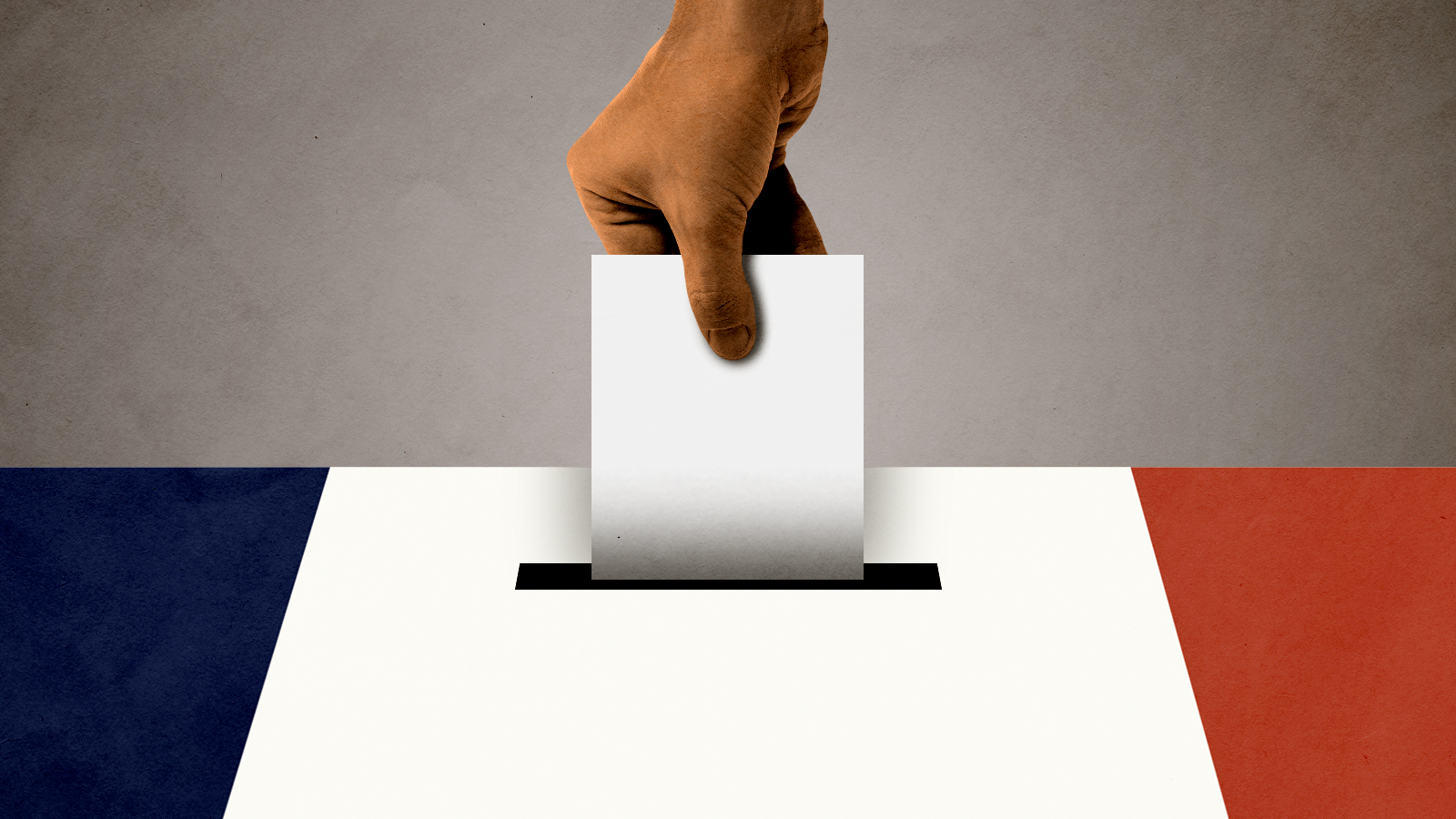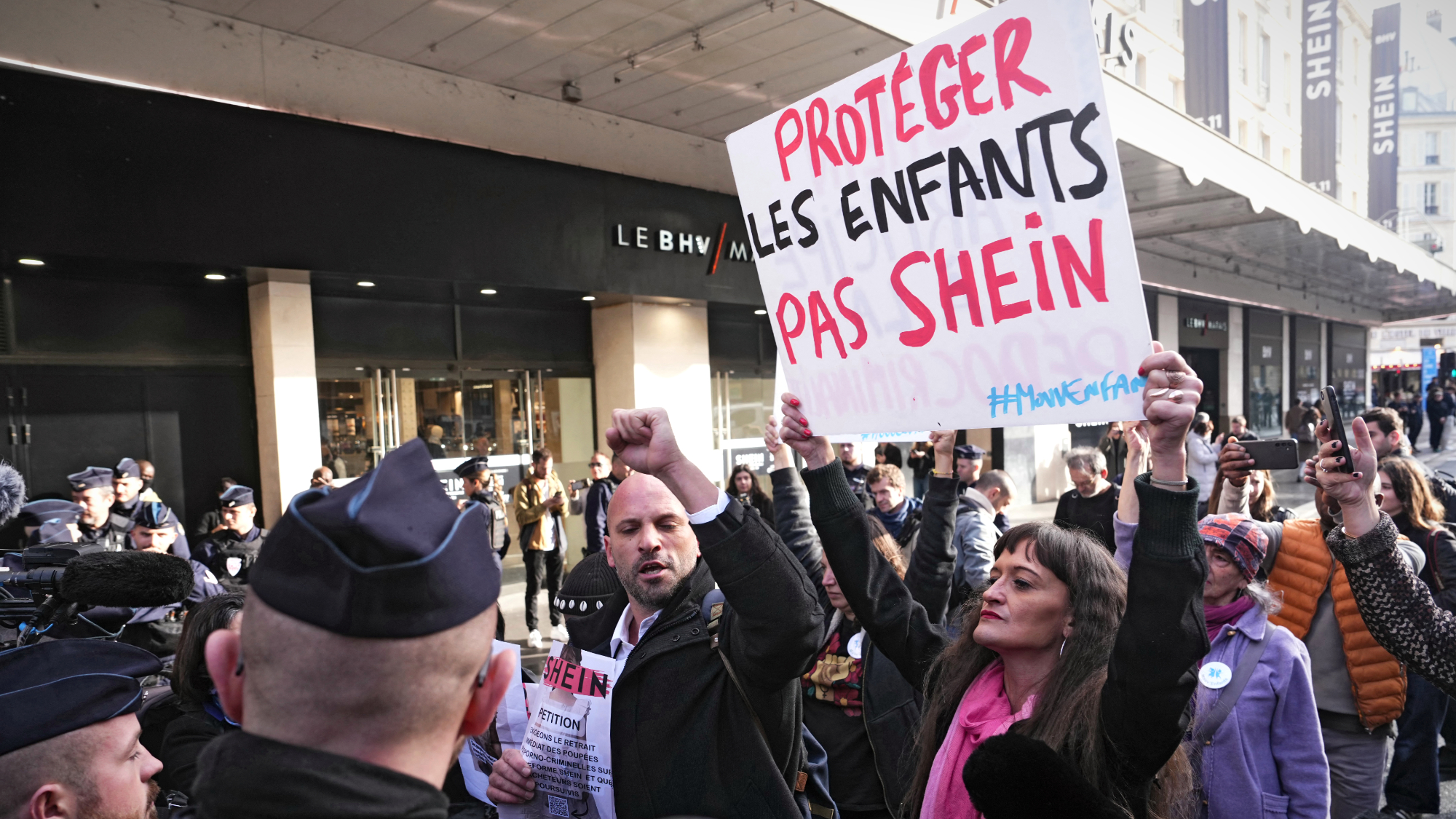What's at stake in France's parliamentary elections?
Voters will decide the fate of President Emmanuel Macron's agenda


A free daily email with the biggest news stories of the day – and the best features from TheWeek.com
You are now subscribed
Your newsletter sign-up was successful
Voters in France head to the polls on Sunday for the first round of elections to determine control of the National Assembly, the lower and more powerful chamber of the national legislature. Here's everything you need to know about who is running, how the elections work, and how the results are likely to impact newly re-elected President Emmanuel Macron and his agenda:
What's the backstory?
In the April runoff election to determine the president of France, incumbent Emmanuel Macron bested far-right challenger Marine Le Pen by 17 points, averting a series of potential crises stemming from Le Pen's issue positions, including hostility to the European Union and opposition to supporting Ukraine against Russia's ongoing war of aggression. But whether Macron will be able to actually govern the country will depend on elections to the lower house of France's parliament, the National Assembly, which begin this Sunday and conclude with the second round one week later. And it is here that voters may be more willing to offer a clear rebuke, now that the immediate threat of a Le Pen presidency is gone.
How is power distributed in French politics?
Like in the U.S., it is entirely possible for voters to put one party in charge of the legislature and another in the presidency. In 2000, France amended its constitution to hold presidential and parliamentary elections close together rather than staggering them in a different year, by reducing the length of presidential terms from 7 to 5 years. This was done precisely to avoid the difficulties — including bitter standoffs and inability to pass laws and implement policy — that often accompany this kind of divided government. To make matters more complicated, the French political system also includes a prime minister, who is appointed by the president but must be from the majority party or coalition in the National Assembly. The unusual arrangement whereby a directly elected president shares power with an indirectly elected prime minister is known in political science as "semi-presidentialism." When the president and prime minister are from different parties, the situation is referred to as "cohabitation."
The Week
Escape your echo chamber. Get the facts behind the news, plus analysis from multiple perspectives.

Sign up for The Week's Free Newsletters
From our morning news briefing to a weekly Good News Newsletter, get the best of The Week delivered directly to your inbox.
From our morning news briefing to a weekly Good News Newsletter, get the best of The Week delivered directly to your inbox.
Since the turn-of-the-century reforms were implemented in 2002, there has been no period of cohabitation in France. Voters have seen fit to grant their choice of president a parliamentary majority in order to carry out his agenda. That streak of presidential success in France could come to an end this month, with largely unknown consequences for Macron. Macron's centrist coalition, Ensemble (ENS), has consistently polled between 26 and 28 percent of the vote since early May, putting his group just behind the New Ecologic and Social People's Union (NUPES), an alliance of left-wing parties led by Jean-Luc Mélenchon, the candidate who placed third in the first round of April's presidential election.
At first glance, these polls put Macron's government in mortal peril. However, because of the nature of the French electoral system, Macron's ENS coalition is expected by most pollsters to win a majority. Like the president, each of the 577 deputies in the National Assembly is elected via a two-round system. If no candidate gains a majority in the first round, the top two vote-getters proceed to a second round on June 19th. The second round polling and results often bear little discernible relationship to the first round. In the presidential election, voters of the left and center-right were convinced to cast a reluctant, defensive ballot for Macron, to prevent what they saw as the potential catastrophe of a Le Pen presidency. In this case, with Le Pen's National Rally polling a distant third, many districts are likely to pit candidates from the NUPES and ENS against one another in the second round. Voters from the once-dominant center-right, and many of Le Pen's voters, are likely to be more inclined to hold their noses and support the ENS candidate rather than take a chance on Mélenchon's group. However, Mélenchon shares Le Pen's dissatisfaction with the EU, and it's not unreasonable to imagine his alliance winning a significant share of far-right voters motivated by hostility to the European project.
What are the biggest issues in the elections?
Macron was elected in 2017 on a reform agenda, including raising the comparatively early retirement age of 62 to 65, trimming the number of deputies in the National Assembly, slashing taxes, and making it easier for employers to hire and fire employees. But some of his reforms ran into widespread public opposition, like the 2018 hike in fuel prices that triggered the widely imitated "Yellow Vest" protests. The pandemic and its many challenges put some of Macron's ideas on hold.
Today, he faces a challenge from the left bolstered by the inequities laid bare by the pandemic's cruelty. Mélenchon favors price freezes on basic necessities, a rollback of some of Macron's tax cuts, and institutional and electoral reforms that would amount to a "Sixth Republic," including proportional representation and a weakened presidency. He is also a lifelong critic of NATO and has criticized the use of excessive force by law enforcement, which is in the news after the police shot and killed an unarmed French passenger last weekend when the driver of her car refused to stop. Le Pen's right-wing National Rally shares some issue space with the left, like granting French citizens the right to make new laws via referendum, but her group's rigid anti-immigration stance and social conservatism have limited its broader appeal.
A free daily email with the biggest news stories of the day – and the best features from TheWeek.com
Before any second-round maneuvering happens though, French voters will have their first crack at the voting in Sunday's first round. For those wondering if one of the parties could score a knockout this weekend, it is worth remembering that only 4 of 577 constituencies were decided in the first round of the 2017 elections by a candidate winning more than 50 percent of the vote. That means that the 2nd round elections on Sunday, June 19th will be closely watched and hotly contested, with Macron's legacy and effectiveness on the line.
David Faris is a professor of political science at Roosevelt University and the author of "It's Time to Fight Dirty: How Democrats Can Build a Lasting Majority in American Politics." He's a frequent contributor to Newsweek and Slate, and his work has appeared in The Washington Post, The New Republic and The Nation, among others.
-
 The Olympic timekeepers keeping the Games on track
The Olympic timekeepers keeping the Games on trackUnder the Radar Swiss watchmaking giant Omega has been at the finish line of every Olympic Games for nearly 100 years
-
 Will increasing tensions with Iran boil over into war?
Will increasing tensions with Iran boil over into war?Today’s Big Question President Donald Trump has recently been threatening the country
-
 Corruption: The spy sheikh and the president
Corruption: The spy sheikh and the presidentFeature Trump is at the center of another scandal
-
 Le Pen back in the dock: the trial that’s shaking France
Le Pen back in the dock: the trial that’s shaking FranceIn the Spotlight Appealing her four-year conviction for embezzlement, the Rassemblement National leader faces an uncertain political future, whatever the result
-
 The billionaires’ wealth tax: a catastrophe for California?
The billionaires’ wealth tax: a catastrophe for California?Talking Point Peter Thiel and Larry Page preparing to change state residency
-
 Biggest political break-ups and make-ups of 2025
Biggest political break-ups and make-ups of 2025The Explainer From Trump and Musk to the UK and the EU, Christmas wouldn’t be Christmas without a round-up of the year’s relationship drama
-
 Bari Weiss’ ‘60 Minutes’ scandal is about more than one report
Bari Weiss’ ‘60 Minutes’ scandal is about more than one reportIN THE SPOTLIGHT By blocking an approved segment on a controversial prison holding US deportees in El Salvador, the editor-in-chief of CBS News has become the main story
-
 France targets Shein over weapons, sex dolls
France targets Shein over weapons, sex dollsSpeed Read Shein was given 48 hours to scrub the items from their website
-
 Has Zohran Mamdani shown the Democrats how to win again?
Has Zohran Mamdani shown the Democrats how to win again?Today’s Big Question New York City mayoral election touted as victory for left-wing populists but moderate centrist wins elsewhere present more complex path for Democratic Party
-
 ‘France may well be in store for a less than rocambolesque future’
‘France may well be in store for a less than rocambolesque future’Instant Opinion Opinion, comment and editorials of the day
-
 Millions turn out for anti-Trump ‘No Kings’ rallies
Millions turn out for anti-Trump ‘No Kings’ ralliesSpeed Read An estimated 7 million people participated, 2 million more than at the first ‘No Kings’ protest in June
